All products featured are independently chosen by us. However, SoundGuys may receive a commission on orders placed through its retail links. See our ethics statement.
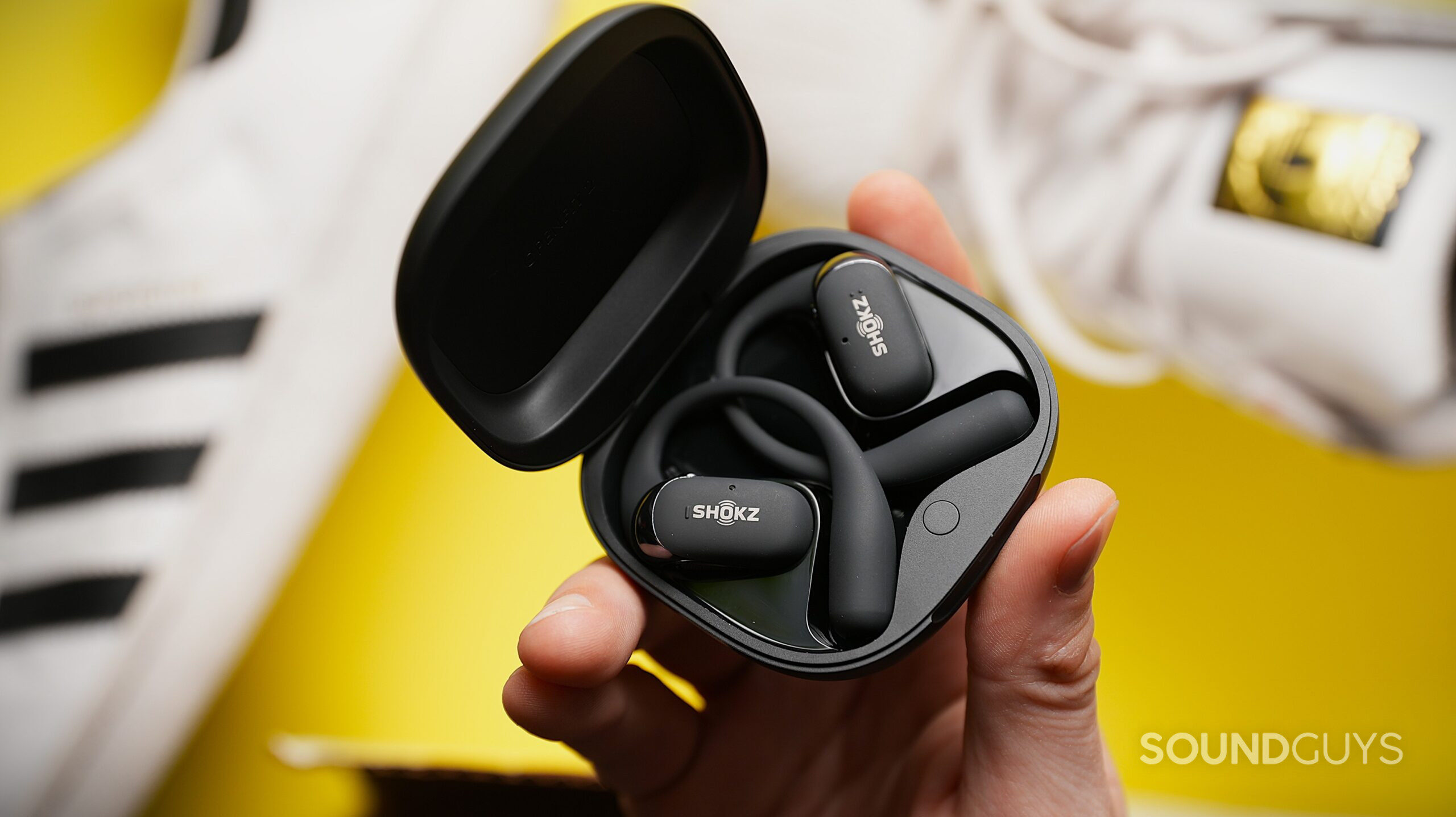
Shokz OpenFit 2 review: Iteration done right
March 12, 2025
OpenFit 2
If you’re like me and like to listen to music while out for a run, you also know the importance of staying aware of your surroundings, especially in a busy city. The Shokz OpenFit 2 is made exactly for that purpose. These open-ear headphones take what made the original OpenFit good and make them better, with improved sound, smarter controls, and marathon-worthy battery life, all without plugging up your ears. Whether you’re dodging traffic on your morning jog or simply want to hear your partner calling from the other room, these earbuds might be for you. Find out if they’re worth the upgrade in our Shokz OpenFit 2 review.
This article was published on March 12, 2025, and this is the first version of the article. Updates will follow as the market changes.
What I like about the Shokz OpenFit 2
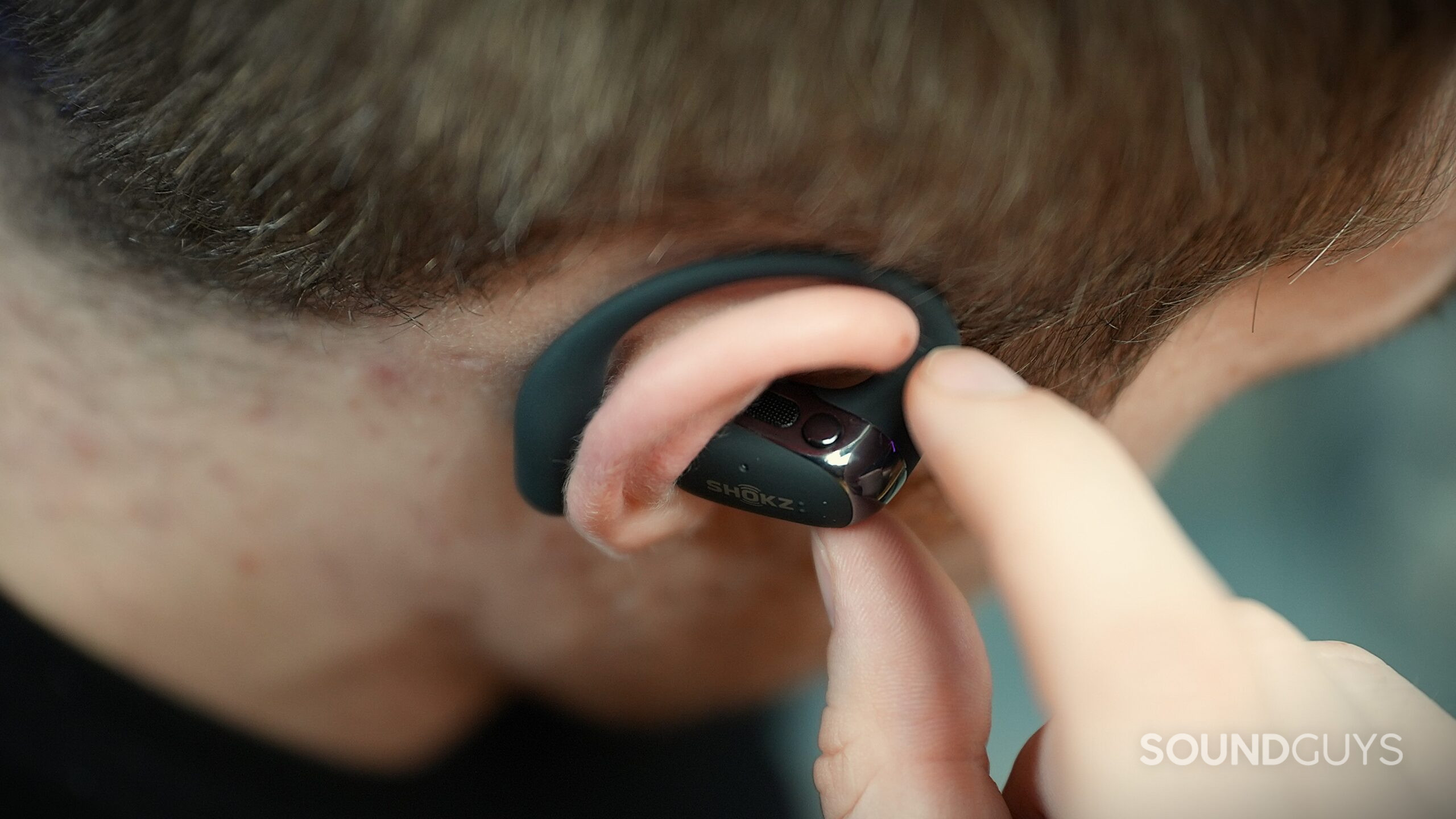
First off, the ear hooks have been redesigned to be thinner than the previous version, resulting in a more comfortable fit behind my ears. The hooks are made of flexible nickel titanium and curve more naturally, distributing pressure more evenly while maintaining a secure fit even while moving around. I wore these through runs, cycling sessions, and strength workouts at the gym, and they remained firmly in place without causing discomfort, even during multi-hour sessions.
The OpenFit 2 are comfortable enough for marathon sessions, with battery life to match.
But perhaps my favorite improvement has been the control systems, with Shokz adding a physical multi-function button alongside the touch panel. I’m not always a fan of touch controls because of accidental false positives when adjusting the fit or requiring multiple attempts to register commands. Especially for active wearers, I think a physical button is not only more accessible during workouts but remains functional even when wearing gloves outdoors. The earbud’s IP55 rating provides solid protection against sweat and rain.
| Input | Outcome |
|---|---|
Physical Button | |
Single click | Play/pause music, Answer/end call |
Double click | Skip to next song, Ignore call |
Triple click | Previous song |
Press and hold (right) | Volume up |
Press and hold (left) | Volume down |
Touch Area | |
Press and hold | Activate Audrey voice assistant* |
*Voice assistant feature must be activated through the Shokz App
Just like the first OpenFit, the Shokz app provides a clean interface with four preset EQ modes (Bass Boost, Treble Boost, Vocal, and Standard) and the ability to create your own EQ in the app. The custom equalizer utilizes a five-band EQ targeting 64Hz, 100Hz, 1kHz, 4kHz, and 8kHz. The addition of Bluetooth 5.4 provides excellent connection stability, and the OpenFit 2 introduces support for Multipoint pairing, which allows seamless switching between two devices.
The new DualBoost technology incorporates two speakers in each bud—one focusing on bass and the other on mids and highs. While open-ear designs inherently sacrifice some bass compared to in-ear buds, I found the Bass boost and Treble boost EQ presets for the OpenFit 2 to produce a fuller, more balanced sound than the default sound that each respectively handles both bass-heavy tracks and vocals and instruments much better. I also found them to be considerably louder than most open earbuds, though not unbearably, which can be helpful in noisy environments.
Battery life is also great, with the earbuds lasting up to 11 hours on a single charge in our testing—a substantial improvement over the original model, which lasted 7 hours. The charging case provides an additional 37 hours, bringing the total to 48 hours of playback. A quick 5-minute charge delivers two hours of playback, perfect for those last-minute workout sessions.
What I don’t like about the Shokz OpenFit 2
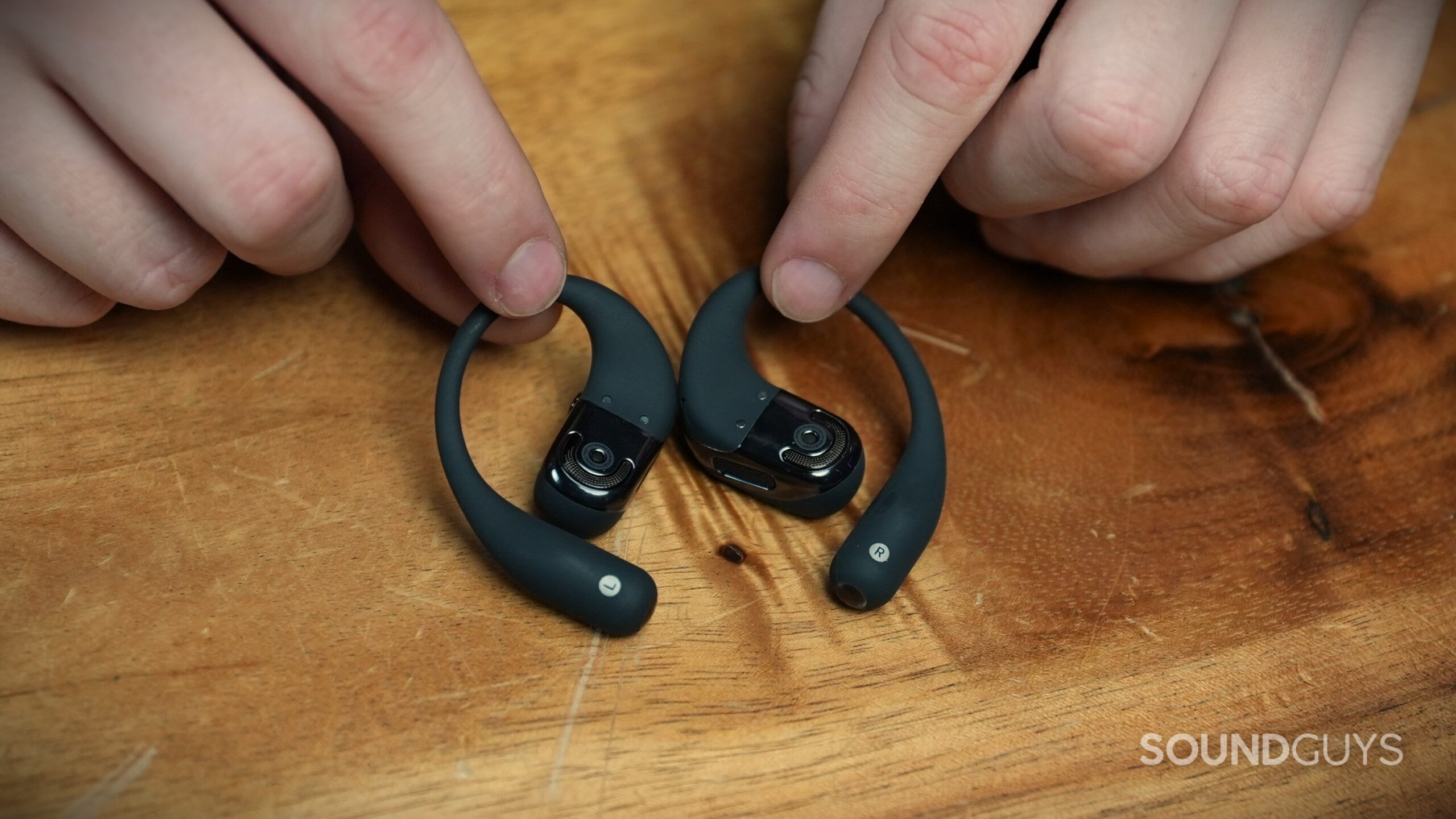
Despite the improvements, the Shokz OpenFit 2 still has limitations inherent to its open-ear design. In particularly noisy environments like busy streets or public transportation, the sound quality noticeably deteriorates as environmental sounds compete with your media. I also found podcasts and audiobooks to be difficult to hear clearly in high-noise situations.
While the sound quality is better than average for open-ear headphones, it still can’t match the immersive experience of getting a good seal with quality in-ear buds. We’ll dig into more of the nitty-gritty in the next section. But at higher volumes, there’s also some sound leakage that can be audible to people nearby, making them less suitable for quiet environments like offices or libraries.
Open-ear convenience comes at a cost - noisy environments will drown out your podcasts and audiobooks.
I also think the absence of wear detection is a notable omission, meaning the earbuds won’t automatically pause when removed or play when put back on your ears. Similarly, there’s no find-my-device functionality for the case, which could be problematic given its small size and black color option that easily blends into dark surfaces.
Lastly, while compact and functional, the case lacks water resistance—something to consider if you’ll be storing it in a sweaty running belt or using it outdoors in the rain.
How do the Shokz OpenFit 2 sound?
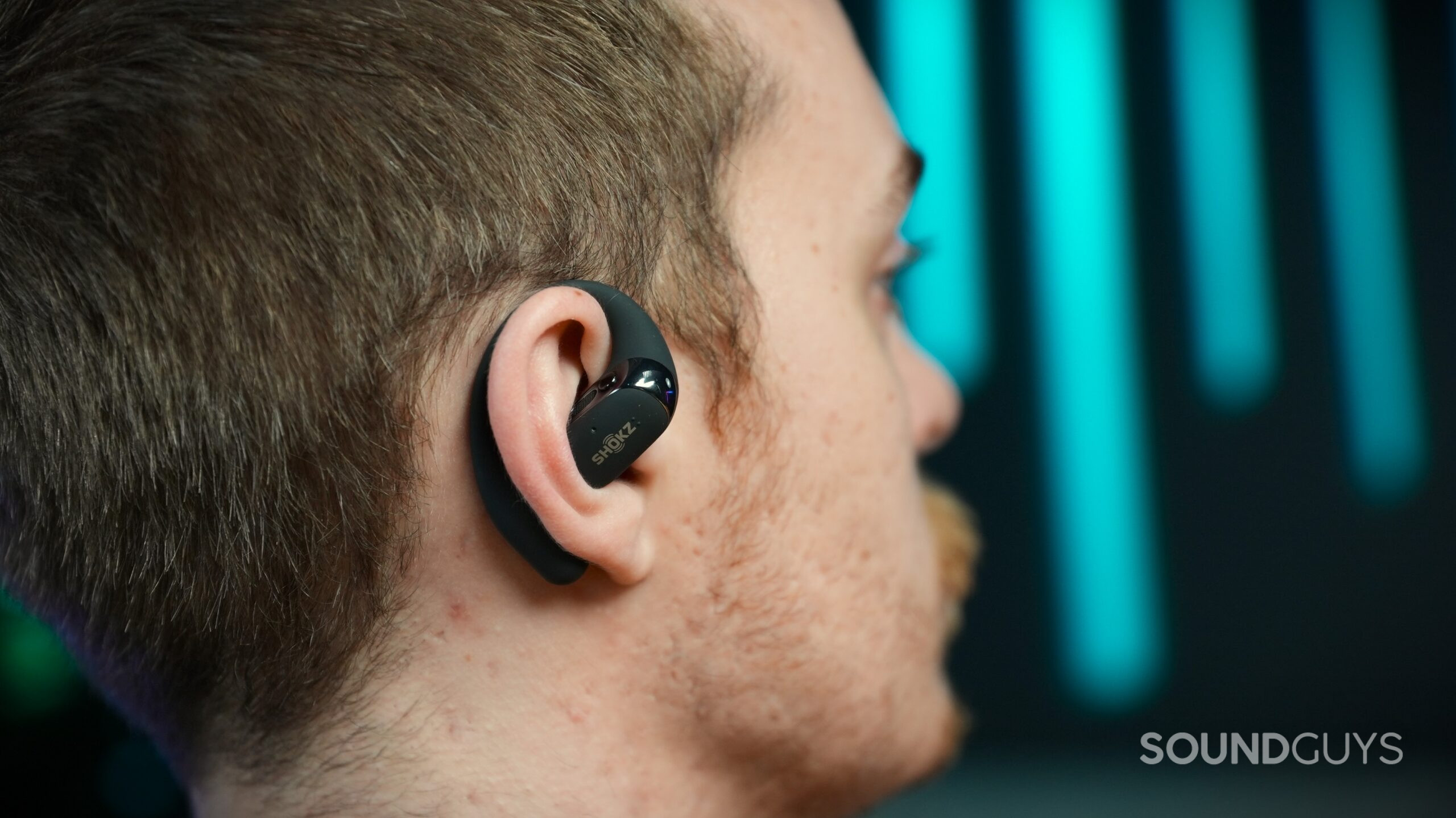
Editor’s note: this review uses a hover-enabled glossary to describe sound quality based on a consensus vocabulary. You can read about it here.
The Shokz OpenFit 2 earbuds deliver a somewhat dark sound signature with a modest bass presence. They sacrifice punch and fullness for environmental awareness yet maintain enough clarity in the midrange to make vocals and most instruments sound natural. Their restrained treble avoids sibilance, making them comfortable for extended listening despite lacking the immersiveness of sealed designs.
Multi-Dimensional Audio Quality Scores (MDAQS)
The chart below shows how the Multi-Dimensional Audio Quality Score (MDAQS) algorithm from HEAD acoustics assesses the sound of the Shokz OpenFit 2. The sound quality is rated on a scale from 1.0 (very bad) to 5.0 (very good).
Before judging the low scores, it’s important to remember that these earbuds aren’t designed for critical listening. Generally, we see lower scores in this category due to the driver being placed outside the ear canal. Still, an overall score of 2 is below average for the open earbuds we have tested thus far.
The good news is that the Bass boost and Treble boost EQ presets deliver more favorable results. Our simulated panel of listeners enjoyed the sound quality with those EQ options much more, giving an overall score of 2.7, which is slightly higher than average for open earbuds but still not the highest score we’ve seen for the category.
- Timbre (MOS-T) represents how faithfully the headphones reproduce the frequency spectrum and temporal resolution (timing information).
- Distortion (MOS-D) represents non-linearities and added noise: higher scores mean cleaner reproduction.
- Immersiveness (MOS-I) represents perceived source width and positioning: how well virtual sound sources are defined in three-dimensional space.
See here for an explanation of MDAQS, how it works, and how it was developed.
Objective Measurements
Loading chart ...
Should you buy the Shokz OpenFit 2?
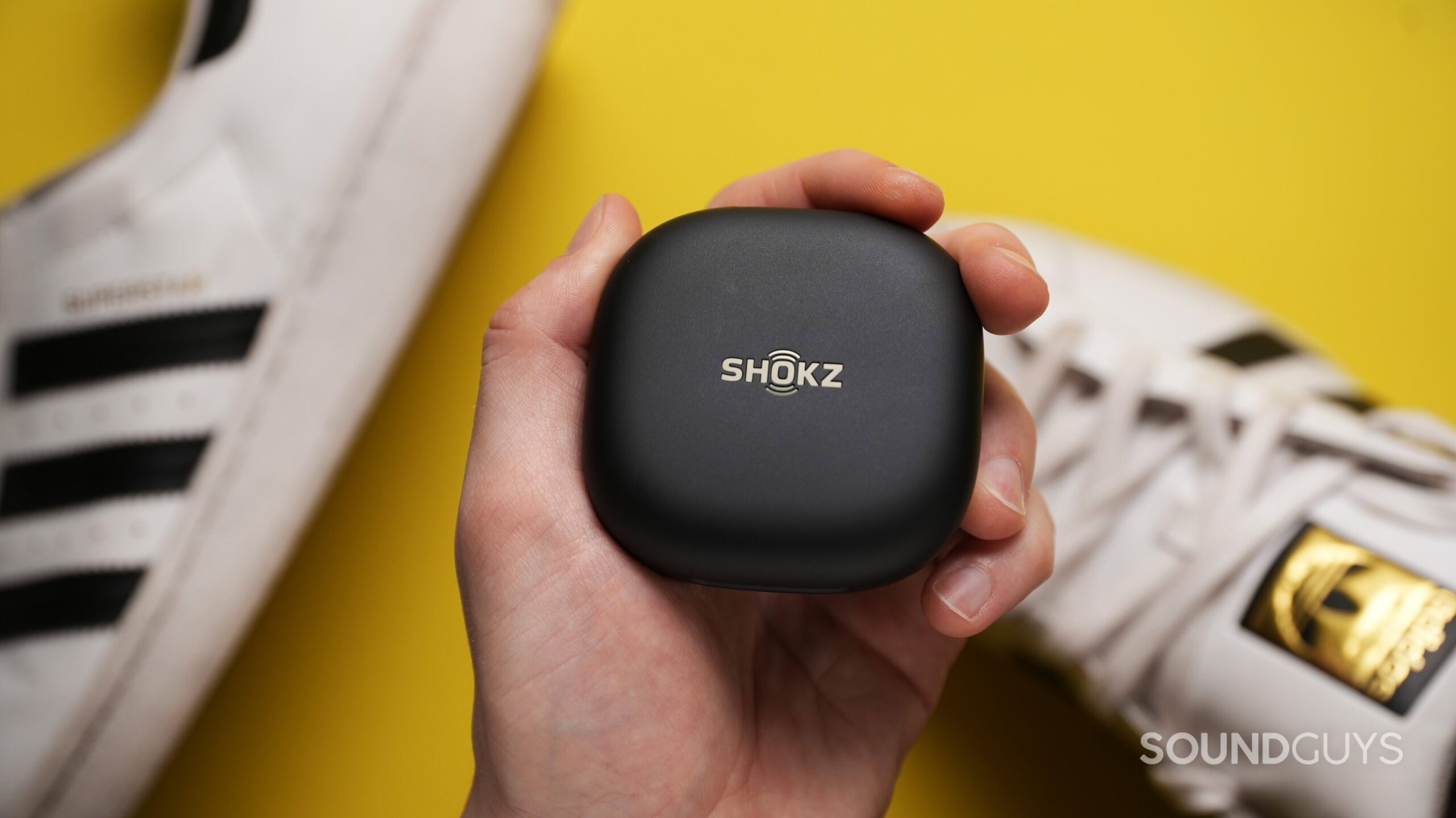
I think the Shokz OpenFit 2 successfully delivers on its promises, offering substantial improvements over its predecessor in all the important areas. For runners, cyclists, and fitness enthusiasts who prioritize situational awareness without sacrificing too much audio quality, these are among the best options available for under $200, and the improved comfort makes them suitable for all-day wear.
The OpenFit 2 is a solid upgrade for athletes who value safety over the best sound quality.
I highly recommend the Shokz OpenFit 2 for athletes and outdoor enthusiasts seeking a good balance between music listening and environmental awareness. The physical button controls, extended battery life, and improved sound make them vastly superior to the original model and worth the investment for active individuals.
For those seeking similar benefits at a lower price point, the Shokz OpenFit Air offers a more affordable alternative at $119, though with reduced sound quality and shorter battery life. However, if you want better audio quality than the OpenFit 2 and want to save some money, the Nothing Ear (Open) currently holds our top spot for the best open earbuds.
Still, for most users seeking open-ear headphones with great battery life, comfort, and good enough sound quality, the Shokz OpenFit 2 will hit the sweet spot of features and value. Still, I’d just suggest to wait for a sale if you can.

Shokz OpenFit 2 review: FAQs
No, the Shokz OpenFit 2 are not bone-conduction headphones. They use speakers positioned outside your ear canal without blocking it, unlike Shokz’s bone conduction models like the OpenRun Pro 2.
The Shokz OpenFit 2 ($179) offers better sound quality with DualBoost speaker technology, longer battery life (11 hours vs. 6 hours), and physical button controls. The OpenFit Air ($119) is a more budget-friendly option with a similar design but fewer features and less refined audio performance.
The Shokz OpenFit 2 earbuds last up to 11 hours on a single charge, with the charging case providing a total of 48 hours of playback. A quick 5-minute charge delivers 2 hours of listening time.
Yes, the Shokz OpenFit 2 supports multipoint connectivity, allowing you to connect to two devices simultaneously.
Yes, the Shokz OpenFit 2 can connect to two devices at once through Bluetooth 5.4 multipoint pairing, letting you seamlessly switch between devices like your phone and laptop.
At normal listening volumes (around 25%), there’s minimal sound leakage. However, at higher volumes, especially with bass-heavy music, people nearby may hear some audio bleed—making them less ideal for quiet environments like offices.
Yes, the Shokz OpenFit 2 can be used for phone calls. They feature built-in microphones and call controls via the physical button (tap once to answer, tap twice to reject, tap once to end).